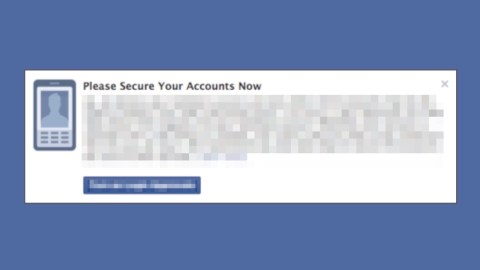Facebook Creates Alert for When the Government Is Hacking Your Profile

Facebook doesn’t mind tracking its users for its own benefits, but anyone else attempting to tamper with its users’ profiles? That’s where the company draws the line. Facebook is rolling out a new notification system that turns the topic of security into a conversation. The company says it will let individual users know when it believes their account is under threat of a nation-state entity.
This is the notification that will appear if Facebook thinks your account has been targeted:

“While we have always taken steps to secure accounts that we believe to have been compromised,” writes Alex Stamos, chief security officer at Facebook, “we decided to show this additional warning if we have a strong suspicion that an attack could be government-sponsored. We do this because these types of attacks tend to be more advanced and dangerous than others, and we strongly encourage affected people to take the actions necessary to secure all of their online accounts.”
One way to battle security and privacy threats is to make them tangible, something we can see and react to. It’s easy to tell people to set up two-factor authentication for their accounts, but it’s difficult to make people take action on it right away. The reason being, there’s no immediacy to it. Why should they change their habits when it costs them more time and they’ve never been hacked?
Facebook’s designers may recognize they have a responsibility to build in more transparent security features in order to protect its users — to make them more aware. In the past, the company has shown its dedication to user demands for more secure options by enabling PGP email encryption options, HTTPS, and Tor access to its site. This new system has the potential to help build a stronger chain of defense. If users think their account may become compromised, they may be more inclined to set up two-factor authentication.
This open policy makes me, as a user, feel more confident in using the platform, knowing that I won’t be guessing if I’ve been part of a hack. (There’s nothing worse than finding out your account may have been compromised years after the fact.) It shows Facebook has a robust security system that it’s able to notify individual users.
Stanley Allen McChrystal believes companies should go one step further and setup a security network with one another “where every time something happens, and we learn from it, the entire network learns immediately.”
—
Natalie has been writing professionally for about 6 years. After graduating from Ithaca College with a degree in Feature Writing, she snagged a job at PCMag.com where she had the opportunity to review all the latest consumer gadgets. Since then she has become a writer for hire, freelancing for various websites. In her spare time, you may find her riding her motorcycle, reading YA novels, hiking, or playing video games. Follow her on Twitter: @nat_schumaker
Photo credit: DIBYANGSHU SARKAR / Stringer/ Getty





